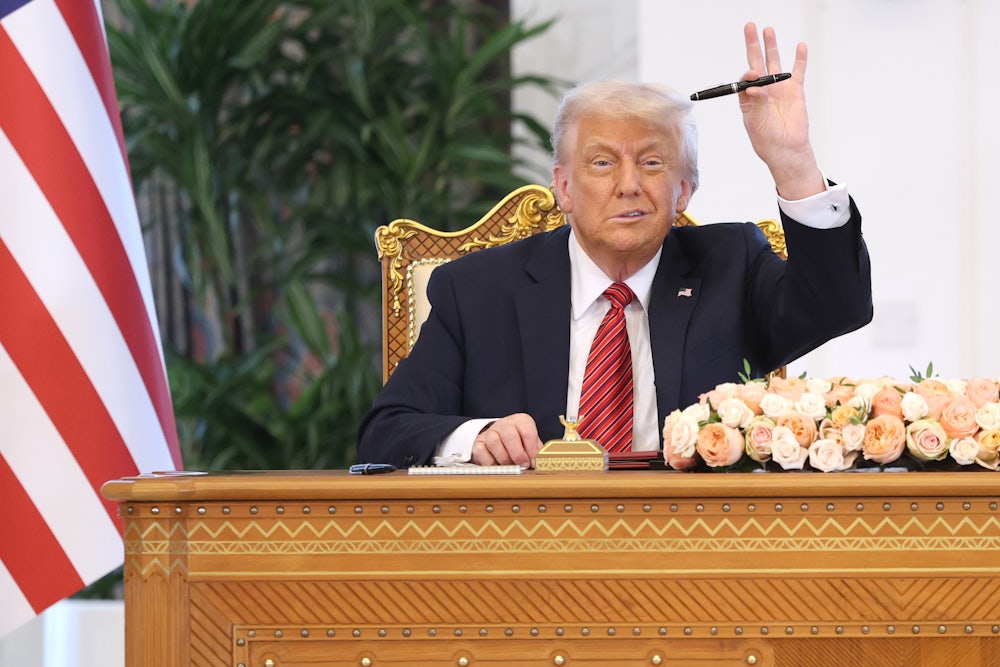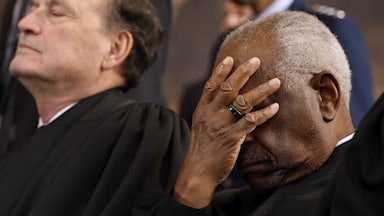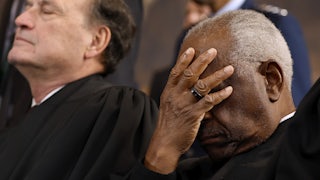Having brought Congress completely to heel in the political sphere, Donald Trump is now seeking to write it out of the Constitution. Both of his biggest moves of the past week entail the evisceration of a constitutional role the Framers very plainly and expressly wanted Congress to play.
That is the case for the flirtation with suspension of habeas corpus, which only Congress can do. And it’s even more manifest in Trump’s plan to accept a $400 million (or is it $625 million?) jumbo jet “palace in the sky” from the Qatari government.
On the habeas issue, Stephen Miller’s pompous primer on suspension of habeas corpus, coupled with the announcement that “we’re actively looking at [it],” was risible and unsettling in equal measure. The constitutional command he was mangling is directed to Congress, not the executive, which is why it is in Article 1, along with other definition of congressional power. The recognition that only Congress can suspend it is essentially universal, consistently reaffirmed in court opinions from early in the nineteenth century, which themselves apply the previous ensconced practice from England.
Moreover, Miller ham-handedly slices off the limiting, second half of the clause: that suspension can occur only when “the public Safety may require it.” Whatever national crisis Trump is attempting to manufacture about the presence of immigrants in the country, the public safety does not require that courts not consider the due process rights of detainees. And Trump’s ensuing suggestion that the decision not to suspend is contingent on “whether the courts do the right thing”—is overbearing and thuggish.
But as bad as all that is, the Qatari 757 deal is even more blatant in its contempt for constitutional norms. The plane would replace Air Force One during the pendency of Trump’s tenure and then be given to his presidential foundation, created after his presidency, presumably for his use. There is, however, a small constitutional snag.
Article 1, Section 9, Clause 8 of the Constitution—the foreign emoluments clause—says that no person holding an office of the United States shall, without the consent of Congress, accept any present “of any kind whatever” (yes, it says those very words) from any foreign state.
Trump’s first term was a serial violation of the domestic and foreign emoluments clauses, as influence-seekers of all stripes clamored to support his Washington D.C. hotel and other businesses. But the business profits he pocketed from people seeking his goodwill in the first term are chump change next to the gaudily lavish, gold-plated, (and possibly bugged) Qatari luxury jet.
There is no serious argument that Trump’s acceptance of the plane does not violate the emoluments clause. Trump has tried to trot out an argument that it’s really a gift to the government and not to him. But if it’s partly for his personal enjoyment—and certainly, if it winds up with his foundation and not the government after his tenure—the law is quite clear that it falls within the clause.
As usual, Trump is his own worst enemy in clarifying just what’s going on. Speaking to reporters on Monday, Trump noted, “I think it’s a great gesture from Qatar. I appreciate it very much. I would never be one to turn down that kind of an offer.”
He also justified the decision by saying he would have to be a “stupid person” not to take the plane, and he analogized the decision to agreeing to a gimme putt in golf. And we further know that Trump toured the jet in February. If Trump is the one to solicit and accept the offer, then it is not a gift to the federal government.
There is apparently an opinion blessing the deal from Attorney General Pam Bondi, who herself garnered six-figure fees from Qatar for lobbying on their behalf starting in 2019. We haven’t seen the analysis yet, but since Bondi views it as her job to fight for Trump the person as opposed to the office, you can bet that it’s, at most, as good an argument as can be made for a client—but a total loser.
The argument that Trump can be expected to rely on in the coming cluster of lawsuits from nongovernmental organizations and state attorneys general is that the various plaintiffs lack standing. That was the central issue in most of the emoluments clause litigation during Trump 1.0. The courts were divided on the question, and eventually the Supreme Court dismissed the various cases as moot because Trump had left office.
In fact, properly understood, the standing issue only reinforces the unconstitutionality of what Trump is doing. It’s true that it’s hard to conceptualize the injury of the constitutional violation in terms of a pocketbook loss to, say, an individual state attorney general. It requires ingenuity and a court that takes a somewhat elastic view of standing.
That’s precisely because the constitutional injury entailed by Trump’s acceptance of the palace in the sky is social, absorbed by all of us. It’s precisely for that reason that the Framers specified that Congress, the representatives of the people, must determine whether a particular gift may be accepted.
After all, not all gifts to officials are objectionable. Most famously, Congress in 1791 passed a resolution allowing Ben Franklin to keep a gold snuff box given to him by Louis XVI. On the other hand, Congress never exercised its authority to approve President Lincoln’s request in the middle of the Civil War to keep an elephant tusk from the King of Siam (along with an elephant, which Lincoln politely declined).
These two examples illustrate that the appropriateness of a particular gift is a nuanced, contextual question. The Framers were extremely concerned about the prospect that gifts could be used corruptly to buy and sell influence. But they declined to constitutionalize a categorical rule against gifts, instead opting for greater flexibility and political accountability by insisting on an overall political judgment by the body best positioned to deliver it.
That judgment, by the way, is pouring in—and it’s largely negative. Many people on the right and left are expressing grave reservations about Trump’s excitement. The thumbs-down by noted conservative commentator Ben Shapiro is illustrative of a growing chorus of disdain from the left and right, a chorus that now includes a number of elected Republicans. On Tuesday, the Senate majority leader, John Thune of South Dakota, said of the jet, “I can assure you there will be plenty of scrutiny of whatever that arrangement might look like.” And Senator Ted Cruz, Republican of Texas, cited national security concerns. “I also think the plane poses significant espionage and surveillance problems,” he said.
It goes without saying—anywhere but in Trumpworld—that the last person to decide whether a gift should be kept is the putative recipient. That means that, questions of standing aside, Trump’s plain constitutional responsibility is, as with Franklin and Lincoln, to serve up to Congress the question of whether he gets to keep his gold-plated palace in the sky.
And if he fails to do that, the plain reading of the Constitution is that he may not keep the plane. To do so would be to accept a present without the consent of Congress.
It’s not an anomaly but a matter of constitutional design that the charter establishes a limit that falls to the political branches to enforce. This being America in the twenty-first century, there surely will be lawsuits attempting to get at the constitutional problem.
But the fundamental dereliction is by our political leaders: If Congress fails to take up the question of whether Trump can keep the plane, it’s a fundamental disregard of its constitutional duties; likewise, if Trump tries to keep his latest and greatest toy without submitting it to Congress, he is flouting the Constitution, whatever Pam Bondi may say. The question, as always with Trump, is not what’s right or lawful or even decent, but whether anybody can stop him.








